Do you want a clear and radiant complexion? The answer should be yes! Healthy glowing skin can be achieved by incorporating the right foods into your diet. The opposite is also true. Certain foods you should try to avoid or at least minimize if you are experiencing certain skin disorders such as acne, eczema, psoriasis, or other inflammatory skin conditions.
As a dermatology physician assistant, I see and treat patients with a large variety of skin disorders from different age groups and backgrounds. While prescription medications can be beneficial for most, I also like to consider a more holistic approach when appropriate. In other words, we can treat from the outside in, but we should also treat from the inside out!
A healthy balanced diet not only can benefit your skin but also benefit many of your other organs and in doing so improve your health in general. Without further ado let’s dive into the foods you should incorporate into your diet and those we should only eat in moderation to achieve that glowing, clear, and radiant complexion so many strive after!
Foods to eat for healthy glowing skin
Fatty Fish
Fatty fish are a good source of protein. Examples include salmon, trout, herring, mackerel, anchovies and sardines. These types of fish are rich in omega-3 fatty acids, which can help reduce inflammation. Since a lot of skin disorders are inflammatory incorporating this into your diet can be very beneficial in achieving healthy glowing skin. As an added perk, omega-3 fatty acids are also essential for heart and brain health.
Avocados
I don’t know about you, but I love avocados! Not only are they delicious and versatile for meals but they are also considered a superfood. Avocados are a healthy fat and have vitamin E and vitamin C. Eating avocados can help keep the skin hydrated and protect it from oxidative damage.
Nuts and Seeds
Another way to help reduce inflammation is by consuming nuts and seeds, which are rich in vitamin E, selenium, and zinc. The best ones for skin health include almonds, walnuts, flaxseeds, chia seeds, sunflower seeds, pumpkin seeds, brazil nuts, and sesame seeds. Just be careful not to overdo it. While these nuts and seeds are beneficial in moderation, they are also calorie-dense.
Leafy Greens
Spinach, arugula, romaine lettuce, and kale are packed with vitamins A, C, K, and antioxidants. They have other health benefits besides promoting skin health and supporting collagen production. They can also reduce the risk of chronic diseases like heart disease, cancer, and age-related macular degeneration, as well as help with blood sugar control. If you are not a big salad eater then you can easily incorporate leafy greens into your diet by adding them in smoothies, soups, and sandwiches.
Berries
Fruits are rich in antioxidants, including vitamin C and anthocyanins. Aim to include blueberries, strawberries, and raspberries in your daily diet. I like to have mine with oatmeal or Greek yogurt every morning. These help protect the skin via antioxidant protection, collagen production, hydration, UV protection, and anti-inflammatory effects.
Sweet Potatoes
White potatoes are out and sweet potatoes are in! Sweet potatoes are loaded with beta-carotene, which is converted into vitamin A in the body. Vitamin A promotes skin cell turnover and can be beneficial in acne-prone individuals. Sweet potatoes also contain vitamin C and other anti-inflammatory effects.
Tomatoes
Tomatoes have vitamin C and other antioxidants which we have established play a part in promoting healthy glowing skin. They also have anti-inflammatory properties including beta-carotene and lycopene. Lycopene is a powerful antioxidant that helps protect the skin from damage caused by ultraviolet radiation from the sun. It may even reduce the risk of sunburn.
Green Tea
Green tea is rich in antioxidants and also contains anti-inflammatory properties that can be helpful with skin conditions such as acne, eczema, psoriasis, and rosacea. There are antibacterial properties found in green tea which may suggest how it can help treat acne-causing bacteria on the skin.
Turmeric
Interestingly, turmeric has traditionally been used to promote wound healing and skin regeneration. There are a lot of products now that incorporate this spice into their ingredients for its anti-aging effects. It is also rich in antioxidants and anti-inflammatory properties due to its active compound curcumin.
Probiotic Foods
Taking a multivitamin and a probiotic is recommended since most people don’t get all of their vitamins and probiotics from their diet alone. Probiotics can be found in yogurt and certain vegetables. The benefit of probiotics is they can help balance your gut microbiome which can in turn have a positive impact on inflammatory skin conditions like acne, rosacea, and eczema.
Water
Okay okay, water is not food, but it is essential to stay well hydrated to have healthy glowing skin. Aim for at least 64 oz a day or 8 cups. If you are an overachiever you will aim for 100 oz a day or 12.5 cups of water!
Foods to limit and only eat in moderation
Processed Foods
Processed foods can increase inflammation in the body and in doing so lead to skin issues because they often contain high levels of sugars, unhealthy fats, and artificial additives.
Sugar
High intakes of sugar can lead to a process called glycation. This is when sugars attach to proteins, including collagen, leading to premature aging and dull skin.
High-Glycemic Index Foods
Foods that rapidly raise blood sugar levels, like white bread, pastries, and sugary cereals, may contribute to acne. This has been studied and found to be true mostly in teenage males.
Dairy Products
High intakes of dairy (cow’s milk) have been proven to contribute to worsening acne. Similar to high-glycemic index foods this has mostly been found to be true in teenage males.
Fried Foods
Unhealthy fats including trans fats can increase oxidative stress and inflammatory levels in the body, which may then lead to worsening inflammatory skin disorders.
Alcohol
Alcohol consumption can not only dehydrate the skin but can also dilate blood vessels, leading to redness and inflammation. We know for a fact that alcohol is a common trigger in people with rosacea.
Sodium
High-sodium diets can dehydrate the skin and lead to puffiness and inflammation.
Caffeine
Some caffeine is considered to be fine but high intakes of caffeine, on the other hand, can dehydrate the skin and worsen skin disorders like rosacea.
Saturated Fats
Excessive intakes of saturated fats from sources like red meat and full-fat dairy may contribute to inflammation and skin issues. We know this to be true in conditions like psoriasis.
It is possible and important to nourish your body with foods to help promote clear, healthy, glowing skin. Making sure you stay well hydrated and get enough sleep is also vital to your skin and overall health. I hope this article helps you achieve your skincare goals! If you are someone who has improved a pre-existing skin condition by changing your diet, let us know how you did it in the comments below!
Related post: 5 Common Skin Conditions Affected By Your Diet
*Disclaimer: Opinions expressed are solely my own and do not express the views or opinions of my employer. Information on this website is for education and entertainment purposes only. Content is my opinion. It is not substituted for your own doctor’s medical care or advice. One should not make any health or medical-related decisions based in whole or in part on any content on this site. Content is not intended to replace the services of a licensed, trained health professional. Content may not apply to you as an individual. Although I will update my website with current information, this website is not a definitive guide to dermatology.
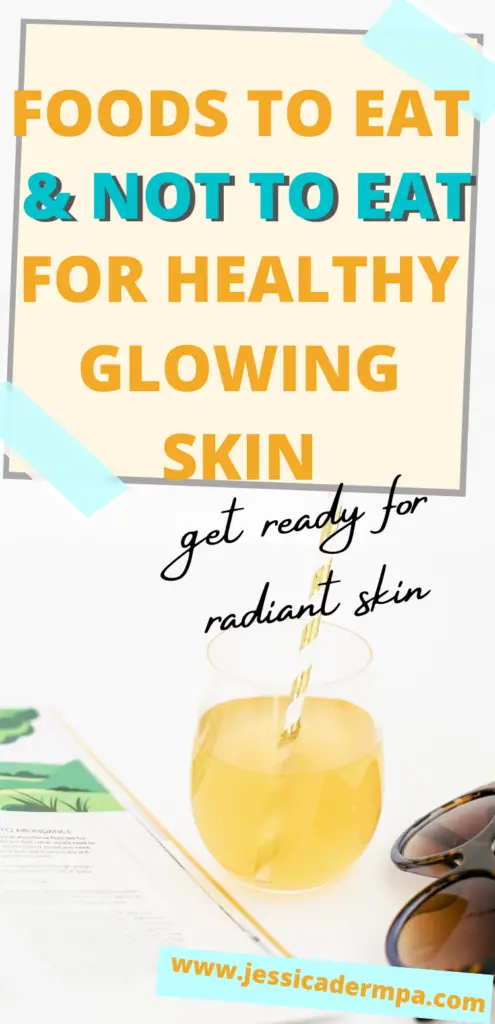
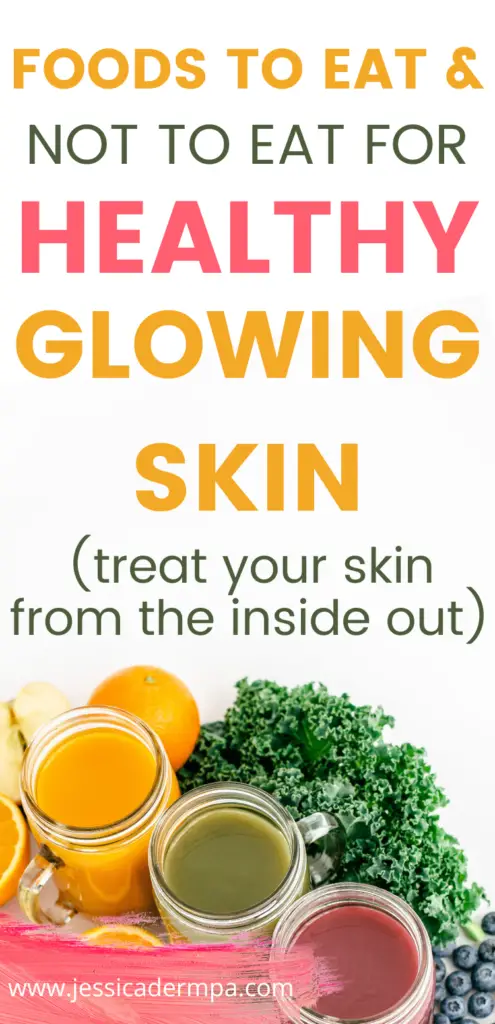
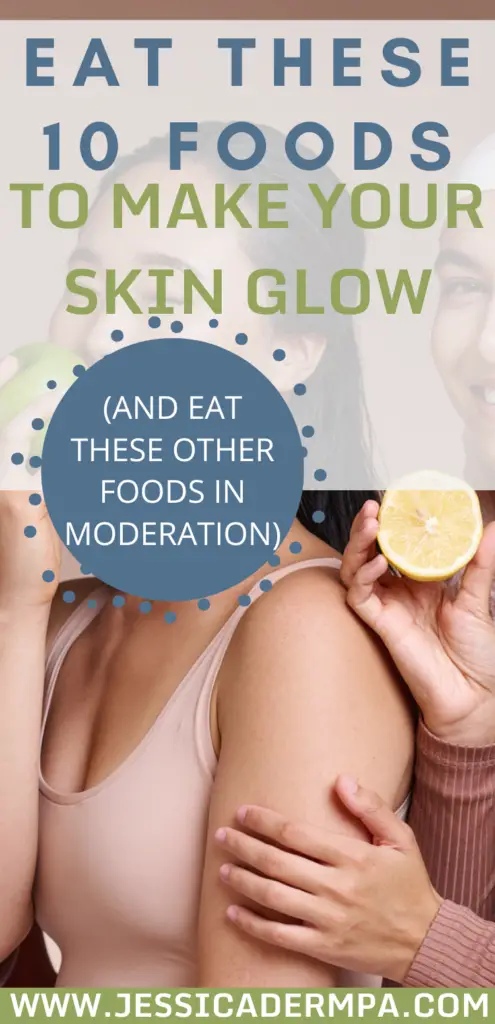

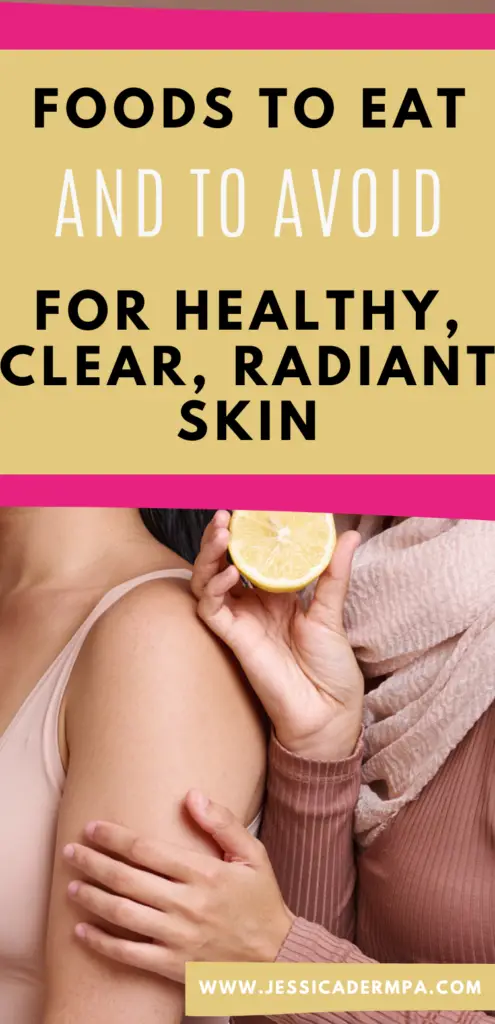
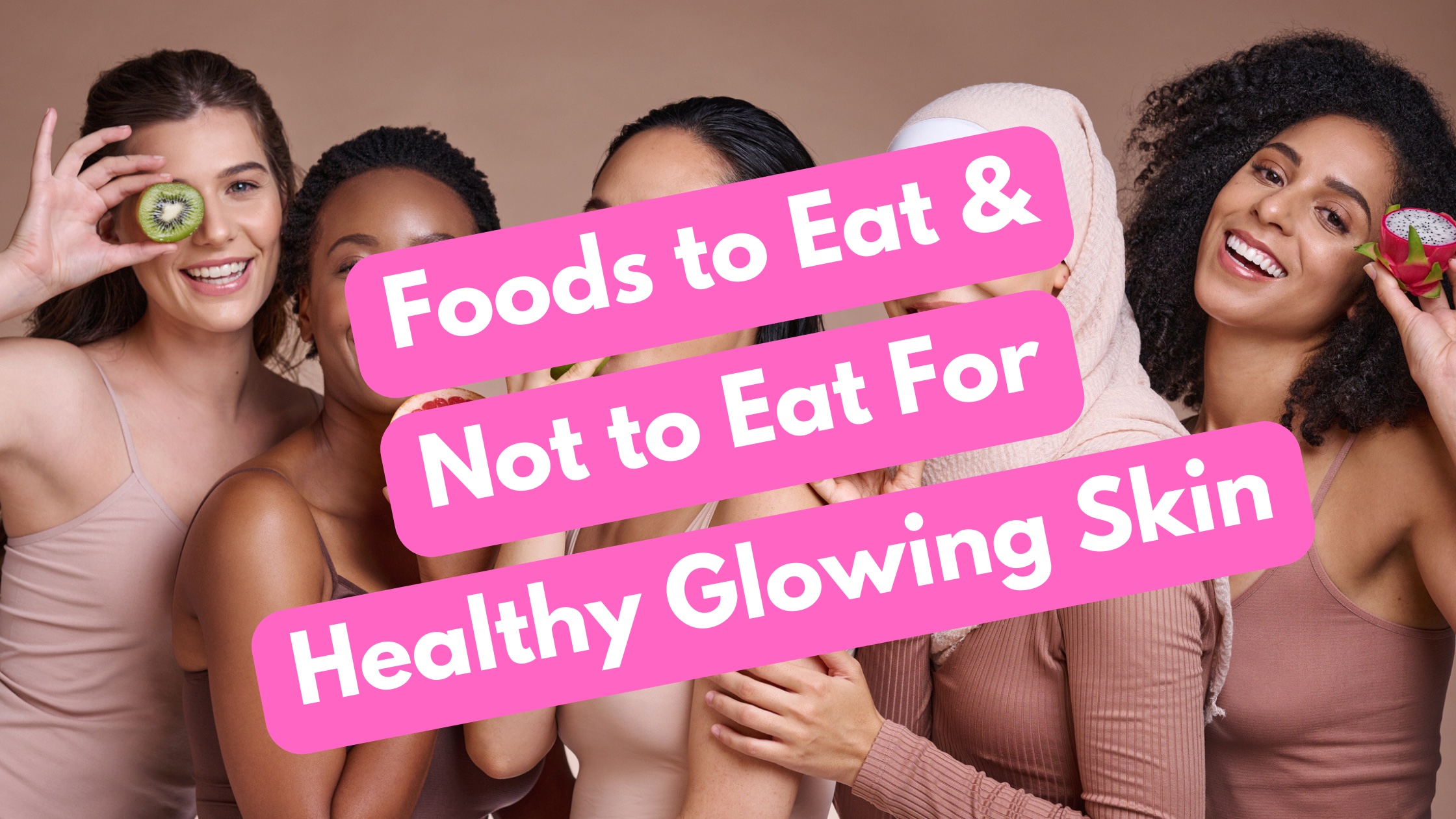
View comments
+ Leave a comment